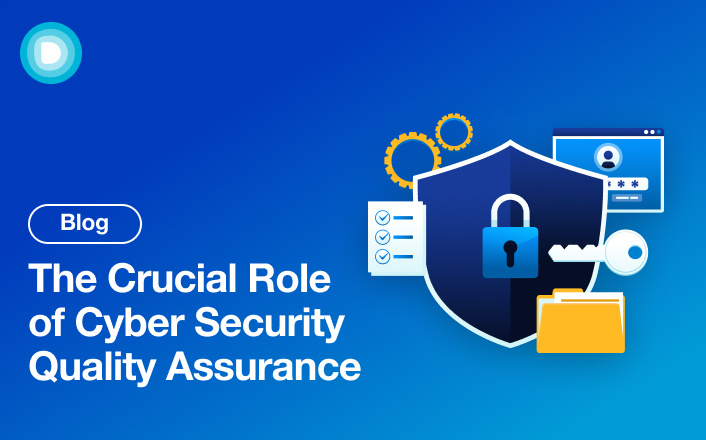- Product
-
Solution
-
By Industry
Cybersecurity solutions tailored to your industry’s needs.
-
- Resources
-
Books
Our ultimate guides and playbooks
Solution Briefs
Overview of PureDome’s functionality
-
Quizzes
Assess your cybersecurity readiness
Case Studies
PureDome customer success stories
Newsletter
Subscribe to the PureDome newsletter
-
- About Us
- Partner
- Pricing
- Download
The Crucial Role of Cyber Security Quality Assurance
-
Aiman Ikram
-
16 May 2024
- 3 min read

.png?width=1728&height=834&name=Feature%20image-%20The%20Crucial%20Role%20of%20Cyber%20Security%20Quality%20Assurance%20(1).png)
Companies need to keep their info safe from hackers. A lot about firewalls and encryption is heard about online safety. But there's another key player: Quality Assurance (QA). It's not talked about as much, but QA is big in making sure our cybersecurity is top-notch. Let's read more about how QA keeps organizations safe from cyber threats.
Understanding Cyber Security Quality Assurance
We rely heavily on data, but keeping it secure is a big worry. Data breaches and cyber-attacks have made millions of private records public, leading to serious problems like identity theft and financial fraud.
Cybersecurity helps keep data safe. It's all about protecting digital devices, networks, and sensitive info from sneaky access. Malicious actors use various tactics, like DDOS attacks and phishing, to try to get in.
Cybersecurity makes sure our sensitive info stays safe by following different practices and giving users a smooth experience they can trust.
Quality assurance is like an extra layer of protection. It ensures products are top quality and safe. QA finds and fixes any problems to lower the chance of security breaches or failures.
Importance of Quality Assurance in Cyber Security
- Spotting Weaknesses: Quality assurance in cyber security is like a safety inspector for digital systems. It finds and fixes any weak spots that hackers could sneak through.
- Boosting Confidence: With QA, we can trust that our cyber defenses are strong. It ensures that our digital locks are secure, keeping our data safe from cyber-attacks.
- Preventing Disasters: QA helps prevent disasters before they happen. By catching and fixing issues early on, it stops cyber-attacks in their tracks, saving us from potential breaches and chaos.
- Continuous Improvement: Quality assurance isn't a one-time thing. It's an ongoing process of testing and improving our cyber security measures, ensuring they stay effective against evolving threats.
Cyber Security Quality Assurance: Key Insights
- Every 39 seconds, a cyber-attack strikes, affecting one in three Americans, says a study by Maryland University. The resulting data breaches could cost over $150 million.
- Juniper Research warns that with increasing internet-connected infrastructure, cybercrime will surpass previous years' costs for businesses.
- Shockingly, over 77% of businesses lack a cyber security plan, leaving them vulnerable to attacks.

Main Components of Cyber Security Quality Assurance
The main components of Cyber Security Quality Assurance are:
Risk Assessment: This involves identifying potential security risks and vulnerabilities in digital systems, networks, and software.
Testing and Validation: QA teams conduct thorough testing to ensure that security measures, such as firewalls and encryption, are working effectively.
Compliance Monitoring: QA ensures that systems comply with industry standards, regulations, and best practices for cybersecurity.
Incident Response Planning: Developing and implementing plans to respond effectively to cybersecurity incidents, minimizing damage and restoring normal operations swiftly.
Continuous Improvement: QA involves ongoing monitoring, analysis, and adaptation of security measures to address emerging threats and maintain strong protection.
Implementing Quality Assurance Processes
Making sure our cybersecurity works well involves a few key steps. First up, there's something called Zero Trust Network Access (ZTNA). It's like a security guard that checks every person and device trying to access our data, no matter where they are.
Then, we need to do regular checks, like giving our systems a health check-up. This helps us find any weak spots so we can fix them up before anything bad happens.
It's also super important to teach our team how to stay safe online, like spotting threatening emails and using strong passwords.
And last but not least, we need to keep an eye on things all the time. Cyber threats are always changing, so we need to update our security measures regularly to stay one step ahead of the hackers. This way, our sensitive information stays safe from cyber threats.
.png?width=1728&height=836&name=The%20Crucial%20Role%20of%20Cyber%20Security%20Quality%20Assurance%20(2).png)
What’s In The Future?
Smarter Cybersecurity with AI: In the future, we'll see more use of Artificial Intelligence (AI) to beef up our digital defenses. AI can help spot and stop cyber threats faster and more accurately. It's like having a super-smart assistant keeping an eye out for any sneaky activity online.
Everyone's a Stranger: Zero Trust Security: Picture this: in the future, it won't matter if you're inside or outside the digital gates. Every user and device will need to prove themselves trustworthy before getting access. It's like checking IDs at the door of a party to make sure only invited guests get in, keeping the riff-raff out and our data safe.
Locking Down the Internet of Things (IoT): With more and more everyday devices connecting to the internet, like smart fridges and thermostats, keeping them safe from hackers is becoming a big deal. In the future, we'll work on making these devices more secure.
The Role of PureDome
PureDome provides comprehensive protection against online threats. As a leading cybersecurity solution, it offers advanced features such as real-time threat detection, malware prevention, and secure web browsing. With PureDome, users can browse the internet safely, knowing that their digital activities are shielded from cyber threats.
Frequently Asked Questions
What is PureDome?
PureDome is a cybersecurity solution that offers real-time threat detection and secure web browsing to protect users from online threats.
How does PureDome work?
PureDome uses advanced features like malware prevention to ensure that users can browse the internet safely and securely.
Why is PureDome important?
PureDome provides comprehensive protection against cyber threats, giving users peace of mind knowing their digital activities are safeguarded.